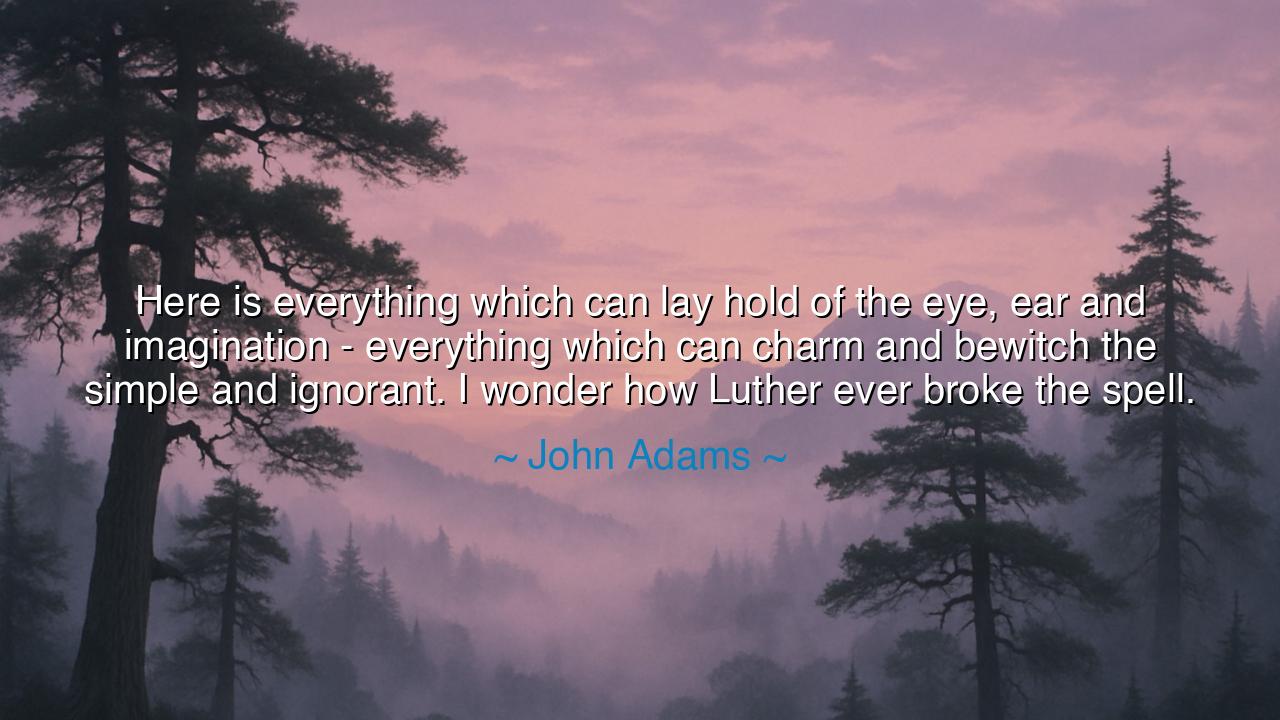
Here is everything which can lay hold of the eye, ear and
Here is everything which can lay hold of the eye, ear and imagination - everything which can charm and bewitch the simple and ignorant. I wonder how Luther ever broke the spell.






“Here is everything which can lay hold of the eye, ear, and imagination — everything which can charm and bewitch the simple and ignorant. I wonder how Luther ever broke the spell.” — thus spoke John Adams, one of the architects of liberty and a man of reason, as he stood in awe of the majesty of the Catholic Church during his travels in Europe. These words, written in the 18th century, are not the sneer of a skeptic, but the astonishment of a philosopher gazing upon the power of imagination harnessed by faith. Adams, though a rationalist and a son of the Enlightenment, recognized in religion — and particularly in its art, music, and ritual — a force that could move the hearts of men beyond reason’s reach. He saw how these symbols and sounds held humanity captive, enthralled by beauty and mystery, and he marveled that one man — Martin Luther — had found the courage to break that enchantment.
The origin of this quote lies in Adams’s journey through Europe, where he encountered the grandeur of old cathedrals, the soaring hymns of choirs, and the theatrical splendor of ritual worship. To the mind of an American steeped in reason and republican simplicity, this pageantry was dazzling and dangerous — “everything which can lay hold of the eye, ear, and imagination.” He saw how the senses were captivated, how imagination itself was woven into a golden net of beauty, awe, and authority. To the “simple and ignorant,” as he called them, these sights and sounds were not symbols, but sacred realities. The imagination, once captured, becomes the heart’s ruler; it sees not illusion, but truth wrapped in glory. And so Adams wondered — how could Luther, armed only with words and conscience, tear down a system that had bewitched Europe for a thousand years?
In this, Adams perceived a universal truth — that the imagination is the seat of human devotion. Logic convinces, but imagination converts. The senses are the gates through which the soul is taken captive. It was not theology alone that gave the Church its strength, but its mastery of symbol: the glint of the chalice, the scent of incense, the solemn music that seemed to rise from eternity itself. These things wove a spell stronger than chains, for they spoke not to the mind but to the spirit. And Luther, that lone monk, had dared to challenge not only doctrine but the enchantment of the human imagination. His victory was not only against power, but against wonder itself — against the majesty of centuries that had clothed mystery in gold and stone.
Consider this moment in history as a parable for the ages. Martin Luther, standing before emperors and prelates, armed with nothing but conviction and a Bible, declared, “Here I stand; I can do no other.” In that act, he shattered the illusion that authority must always be clothed in beauty and spectacle. Yet the struggle was not easy, for the spell he broke was not of superstition alone — it was the spell of human longing for mystery, for belonging, for something greater than oneself. Adams, reflecting centuries later, felt the magnitude of that battle and the wonder that Luther’s reason and faith had triumphed over the seductions of sight and sound.
Adams’s awe, however, carries another layer of meaning: a warning. For while he admired the beauty of such power, he saw how easily imagination can be enslaved when guided by fear or manipulation. He was a son of the Enlightenment, believing that truth must appeal to reason rather than to enchantment. Yet even he confessed that such enchantment was nearly irresistible. He understood that to lead humanity toward freedom — intellectual, political, or spiritual — one must not only argue with logic but contend with the forces that bewitch the heart. The revolution of mind must be as vivid as the visions it seeks to replace.
The lesson for us, then, is clear: we must learn both to honor and master the imagination. It is a sacred power, the fountain of art, faith, and inspiration — yet it can also be the tool of tyranny, when beauty blinds the eye to truth. Do not scorn those who are moved by symbol and story; instead, seek to awaken their imagination toward what is real and righteous. For imagination, when illuminated by truth, becomes the greatest ally of wisdom; but when left to wander in shadow, it can bind the world in illusion.
And so, as John Adams wondered how Luther broke the spell, let us wonder also how each of us might break the enchantments of our own age — the glitter of false ideals, the hypnotic hum of distraction, the illusions of power and wealth. The task of freedom, whether in faith or in life, is to see through appearances without losing the capacity for wonder. Keep your imagination alive, but let it serve truth. For beauty and reason are not enemies, but companions — and when they walk together, humanity rises from the spellbound sleep of ignorance into the clear light of understanding.






AAdministratorAdministrator
Welcome, honored guests. Please leave a comment, we will respond soon